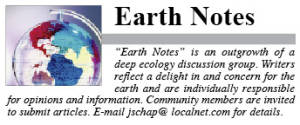Earth Notes: On crows and computers
Driving home from work at dusk just past Deering Oaks on the approach to the law school, I’d watch the sky fill in with crows flying from all directions to the same destination, the trees along the edge of the school’s small parking lot.
That was years ago now. It was a magnificent sight and for me, who never gave much thought to crows, baffling. Easily 50 crows silently landing in two trees. Was there a crow telegraph operator calling them to bed? And, lawyer jokes aside, why those particular rather nondescript trees, instead of all those impressive oaks in the Park?
At the time, a much smaller group of crows appeared each morning in the maple trees in our yard in Portland exactly at six. There was no mystery there though. My husband fed them. Each morning, a raucous caw cawing woke us. In case Peter hadn’t heard the racket, I’d elbow him — gently, of course — and mumble, “Your friends are here.†Out he would go, coat over his pajamas, with whatever crow delectable he had and down they would fly to eat at his feet. In addition to being able to use tools and to count, crows seem able trainers of us humans, as well.
We have crows here in Casco, of course, though I have never seen them gather in the numbers I did in Portland, nor are they as habituated to humans here as they appear to be in Portland. In our first few years in Casco, Peter left food for the crows on a granite outcropping in the field, but he would be back in the house before three crows, one in a tree as sentinel, appeared to carefully examine and then take the food. Often, the crows would arrive much later, which led to the food attracting critters we didn’t want to feed, so we stopped feeding the crows and the crows ceased making their daily visits. Ron Johnson, Extension Wildlife specialist at the Department of Fisheries and Wildlife, University of Nebraska-Lincoln notes behavioral changes in crows that nest and roost in urban areas. As we noticed, urban crows are more habituated to humans than rural crows. They’ve readily adapted to the changes and opportunities for habitat and food that an urban environment offers.
Although I admittedly notice birds only when they seem out of place, like the robin I saw on a snow bank in Bridgton in January or those crows at dusk in the trees in Portland, crows are part of our collective imagination from Shakespeare to Alfred Hitchcock. We pass laws to protect them and laws to hunt them. In Celtic mythology, the goddess of war and death (Morrighan) appears as a crow or a raven, often in a group of three. Old women are often referred to as crows. Products are sold to prevent or minimize crow’s feet. And we may be required to “eat crow†when, as World Wide Words suggests, “when (we) have made a serious error and need to acknowledge it humbly.†Although like that author, I haven’t actually eaten crow meat, it perhaps isn’t very tasty, so the phrase is apt.
For a mindfulness exercise in a photography class recently, I took a picture of what I am mindful of: a group shot of my laptop, my smartphone, my tablet and my coffee maker, each of which I’d spent too much time that week mindfully getting to work and with which I mindfully spend too much time each day. Was it Thoreau who said, “Men have become the tools of their tools?†Still, like the crows, I am adapting to a new habitat — one with a new language. One morning as I labored over one of my labor-saving devices in that habitat, the one created by Microsoft, I looked up and out the window in time to see a crow flying low over the bird feeder. Occasionally, I throw the rinds from the suet feeders underneath it for the ground feeding birds. Never before had a crow come this close to the house. I watched it land a few feet from the suet rind, approach it warily, poke it and leap back, poke it and leap back. Crows have good memories and perhaps suet equals potential trap. Eventually however, after repeated pokes and jumps, the crow flew off with the suet.
This morning, a fluttering of wings in the corner of my eye and I looked up from my laptop: a crow flew back and forth above the bird feeder. He hasn’t forgotten but I have; there are no suet rinds on the ground.



